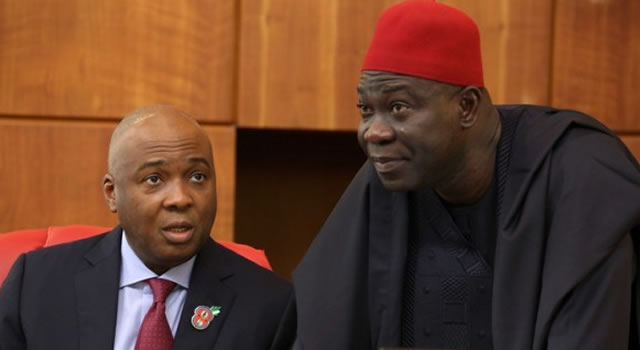Politics
NotTooYoungToRun: Why we didn’t reduce age for Senate, governorship— Ekweremadu

The Deputy Senate President, Ike Ekweremadu, has provided an explanation for why the age qualification for the Senate and governorship was retained.
As it pertains to the Senate, he said the decision was to correct the initial disparity in the 1999 Constitution between the age requirement for the Senate and the Presidency.
Qualifying age for the Presidency, which used to be 40 years, has now been reduced to 35. President Muhammadu Buhari signed a bill making this law on Thursday.
The bill, which was passed by the National Assembly last year to alter Sections 65, 106, 131, 177 of the constitution, had sought to reduce the age qualification for President from 40 to 30; Governor from 35 to 30; Senator from 35 to 30; House of Representatives membership from 30 to 25 and State House of Assembly membership from 30 to 25.
But in the final bill given to the president for assent and which he assented to, the age qualification for governor and senate was retained at 35 years contrary to the demands of the movement.
Buhari had made the shocking disclosure, which had prior to that time remained unknown, that the bill presented to him for assent had no reduction in the age requirement for the offices of senator and governor, meaning the age would still be left at 35. He said he hoped it will be looked into
Responding to this development, a fresh demand was made to the National Assembly by the Not Too Young To Run movement to revisit that aspect of the amendment.
The group had earlier on Friday, called on the National Assembly to review its vote on the age qualification for the senate and governorship.
This was top of the demands made by the movement on Friday at a press conference in Abuja.
The head of the group, Samson Itodo, said the review should be in tandem with its initial proposal which put the age qualification for governor and senate at 30 years.
The movement described the retention of the 35 years for both offices as “unfortunate and disappointing” as it urged the National Assembly to revisit its vote.
But explaining the rationale behind its decision, Ekweremadu, who is also the chairman of the Senate Committee on Constitution Review, said the National Assembly reasoned that going by the provisions of Section 146 of the 1999 Constitution as amended, the president of the Senate could hold the office of the President for a period not exceeding three months should the offices of the President and Vice President be vacant at the same time for any reason.
In a statement signed by his Special Adviser on Media, Uche Anichukwu, Ekweremadu explained that Section 146 (1) provides that the Vice-President shall hold the office of President if the office of President becomes vacant by reason of death or resignation, impeachment, permanent incapacity or the removal of the President from office for any other reason in accordance with section 143 of the Constitution.
Read also: Not Too Young To Run Act: APC dubs PDP a killjoy, as opposition party attacks Buhari
“However, Section 146 (2) further provides that where any vacancy occurs in the circumstances mentioned in Sub-section 1 during a period when the office of Vice-President is also vacant, the President of the Senate shall hold the office of President for a period of not more than three months, during which there shall be an election of a new President, who shall hold office for the unexpired term of office of the last holder of the office’.
“So, since the President of the Senate, a Senator, could become an Acting President by happenstance, it is only right that the qualification for both offices are the same,” he said.
Speaking on the retention of age qualification for the office of the governor, he said the majority opinion was that 35 years should be ideal for now to enable the would-be governors acquire the requisite experience to pilot the affairs of a state.
“However, the Not-Too-Young-To-Run amendment is just one giant step forward. It is not the end of the road, but just the beginning of the road. It is not an end in itself, but a means to an end.
“I believe that anyone, who is 18 years old and qualified to vote should also be qualified to stand for an election. This is our ultimate target and I believe we will get there. So, it is work in progress because constitution amendment is a continuum,” he said.
He urged the youth to mobilise into the political parties in their numbers to begin to influence party decisions, push for direct primary elections, internal democracy, level playing ground, and other reforms that will complement the provisions of the current millage achieved by way of the Not-Too-Young-To-Run amendment.
RipplesNigeria… without borders, without fears
Click here to join the Ripples Nigeria WhatsApp group for latest updates.
Join the conversation
Support Ripples Nigeria, hold up solutions journalism
Balanced, fearless journalism driven by data comes at huge financial costs.
As a media platform, we hold leadership accountable and will not trade the right to press freedom and free speech for a piece of cake.
If you like what we do, and are ready to uphold solutions journalism, kindly donate to the Ripples Nigeria cause.
Your support would help to ensure that citizens and institutions continue to have free access to credible and reliable information for societal development.






















